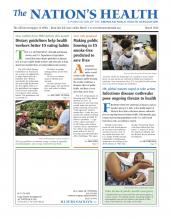A federal proposal now under consideration could eliminate smoking in public housing. The results could have a dramatic effect on public health. And there is even more that can be done.
The U.S. Department of Housing and Urban Development on Nov. 12 announced a new rule that would make the nation’s public housing, more than 3,100 agencies, entirely smoke-free. Under the proposed rule, public housing agencies must prohibit lit tobacco products — cigarettes, cigars and pipes — in all living units, indoor common areas, administrative offices and outdoor areas within 25 feet of housing and administrative office buildings. The agencies would be required to enact the prohibition within 18 months of the rule being finalized.
During the proposed rule’s announcement, HUD Secretary Julián Castro, JD, said the rule’s impact would be felt immediately.
“We have a responsibility to protect public housing residents from the harmful effects of secondhand smoke, especially the elderly and children who suffer from asthma and other respiratory diseases,” Castro said in a Nov. 12 release. “This proposed rule will help improve the health of more than 760,000 children and help public housing agencies save $153 million every year in health care, repairs and preventable fires.”
APHA joined other public health advocates in applauding the proposed rule, calling it a “major step forward in protecting the millions of Americans who currently live in federally owned public housing from the harms of tobacco.” However, APHA noted that the rule could go even further to protect the health and well-being of public housing residents.

HUD Secretary Julián Castro, left, and U.S. Surgeon General Vivek Murthy talk in November following an Alexandria, Virginia, event that discussed the smoke-free housing proposal.
Photo by Sammy Mayo Jr., courtesy HUD
In comments on the rule issued Jan. 14, APHA wrote that the proposed rule makes no mention of electronic nicotine delivery systems, such as electronic cigarettes, or waterpipe tobacco, such as hookahs, and that both should be included in the HUD ban on tobacco use.
“We urge HUD to include electronic nicotine delivery systems and waterpipe tobacco in the final rule…Additionally, we urge HUD to adopt a final rule as soon as possible and extend the smoke-free policy to all federally supported housing,” APHA said in its comments, adding that effectively implementing the policy can improve health equity.
“Implementing a smoke-free policy in public housing is a positive health equity measure, as healthy, smoke-free housing should be available to everyone, regardless of income,” APHA said.
Jason Coates, JD, public health policy analyst at APHA’s Center for Public Health Policy, said that a ban on some, but not all, tobacco products is a start, but that it keeps health and lives at risk.
“HUD’s smoke-free regulation is a positive step to reduce tobacco use and improve health for people across the country,” Coates told The Nation’s Health. “To reduce tobacco use even more, HUD should include electronic cigarettes and waterpipes in the regulation.”
In addition to submitting its own comments, APHA signed on to joint comments with nearly 40 other health organizations. And as the comment period on the proposal drew to a close, other health organizations voiced their support and concerns as well.
In a Jan. 19 news release, the American Academy of Pediatrics, American Cancer Society Cancer Action Network, American Heart Association, American Lung Association and Campaign for Tobacco-Free Kids urged HUD to finalize the rule as quickly as possible to protect all residents’ health — not just the 760,000 children Castro noted when proposing the rule, but people in nearly 1 million homes, with more than 300,000 adults 62 and older as well.
“HUD’s long-awaited action to make public housing smoke-free is a welcome step forward not only to ensure that children will be able to live and breathe safely in their homes, but also to protect low-income families who have no control over the air they breathe in through shared walls and ventilation systems,” said American Academy of Pediatrics President Benard Dreyer, MD, FAAP.
The groups’ comments also included suggestions for including e-cigarettes and hookah in smoke-free policies, as well as preventing current residents from smoking indoors, including playgrounds in the smoking ban and applying the ban to all federally supported housing, not just public housing.
Cigarette smoking is the leading preventable cause of death in the U.S., and kills more than 480,000 each year, according to the Centers for Disease Control and Prevention. Secondhand smoke can cause coronary heart disease, stroke and lung cancer, and causes nearly 34,000 premature deaths among nonsmokers each year, according to CDC research.
“Breathing clean indoor air will greatly improve the cardiovascular health of public housing residents,” said American Heart Association CEO Nancy Brown in a statement. “HUD’s proposed rule ensures that these Americans will no longer be involuntarily exposed to secondhand smoke.”
The comment period for the proposed rule is now closed. HUD will consider comments and may add recommendations to the proposed rule before implementing it. As of early November, it was unknown when the rule might be finalized.
Surgeon General Vivek Murthy, MD, MBA, joined Castro at the rule’s announcement, and commended him for taking an important step for public health.
“Everyone — no matter where they live — deserves a chance to grow up in a healthy, smoke-free home,” Murthy said. “When 58 million Americans…are exposed to secondhand smoke, we have an obligation to act. That is what Secretary Castro is doing with this proposal.”
To read APHA’s full comments on the proposal, visit www.apha.org/policies-and-advocacy. For more on the proposed HUD rule, visit www.hud.gov.
- Copyright The Nation’s Health, American Public Health Association












